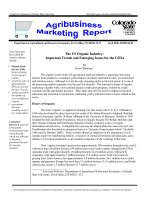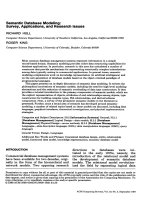Tài liệu tiếng Anh thương mại quản lý Chapter 17 Contract formation and legal issues
Bạn đang xem bản rút gọn của tài liệu. Xem và tải ngay bản đầy đủ của tài liệu tại đây (586.41 KB, 40 trang )
17-1
Chapter 17
Contract
Formation and
Legal Issues
17-2
Key Concepts
•
Litigation Prevention
•
Dispute Resolution
»
Negotiation
»
Mediation
»
Litigation
»
Arbitration
»
Courts
•
Development of Commercial Law
•
Basic Legal Considerations
•
The Purchase Contract
•
Letters of Intent
17-3
Key Concepts
•
Special Legal Considerations
»
Inspection Rights
»
Rights of Rejection
»
Title and Risk of Loss
»
Warranties
»
Evergreen Contracts
»
Order Cancellation and Breach of Contract
»
Liquidated Damages Provision
17-4
Key Concepts
•
Special Considerations (cont’d)
»
JIT Contracts
»
Honest Mistakes
»
Patent Infringement
»
Restraint of Trade Laws
•
International Considerations
»
Contracts for the International Sale of Goods
»
Foreign Corrupt Practices Act
17-5
Litigation Prevention
•
The best way to deal with legal disputes is
to avoid them in the first place!
•
Daily activities of supply managers are
subject to two major areas of the law:
»
Law of Agency
–
Supply professionals act as agents for their firms
»
Law of Contracts
17-6
Why Most Business Firms Utilize Litigation Only
as a Last Resort
•
Contractual disputes are usually resolved
more effectively using negotiation
•
A lawsuit almost always alienates a good
supplier
•
The outcome of any court case is usually
uncertain
•
Litigation is expensive
17-7
Dispute Resolution
•
When attempting to resolve a dispute, it
pays to keep in mind six considerations:
1. Time
2. Money
3. Complexity/Formality of Method of Dispute
Resolution
4. Stress
5. Visibility
6. Damage to the Relationship
17-8
Dispute Resolution
•
Five Options exist to resolve a dispute:
»
Negotiation
»
Mediation
»
Litigation
»
Arbitration
»
Courts
•
Most disputes are best resolved through
negotiation and compromise
17-9
Mediation
•
If negotiation fails, the disputants can
consider mediation
•
Mediation involves introducing a third-
party into the discussion
•
The mediator’s role is to listen,
sympathize, empathize, coax, cajole and
persuade
•
One thing the mediator may not do is
decide anything
•
If the disputants confer decision-making
authority on a third-party, we are now
talking about arbitration
17-10
Litigation
•
Some maintain that if a commercial
dispute reaches litigation, the disputants
regardless of the outcome have
already lost
•
In litigation, costs tend to be maximized
»
Recall: time, money, formality of method,
stress, visibility, and relationship damage
17-11
Arbitration
•
Arbitration vests the decision-making
authority with the arbitrator
»
Purchase orders often have arbitration clauses
»
It is critical to employ an impartial arbitrator
»
A good source in the U.S. is the American
Arbitration Association
•
The arbitrator will hear testimony and
study evidence from both sides, then
make a decision based on the facts
17-12
Courts
•
Litigation may be brought to state or
federal court.
»
Lawsuits heard by judge or jury.
»
Relevant court rules govern procedure.
»
Relevant rules of evidence prescribe what may
or may not be presented.
•
Best to avoid destructive legal disputes
whenever possible.
17-13
Development of Commercial Law
•
National Conference of Commissioners on
Uniform State Law (NCCUSL)
»
Uniform Sales Act
»
Uniform Commercial Code (UCC)
–
Determines rights on basis of fairness and
reasonableness in light of accepted business
practices
–
Topics treated throughout the rest of the chapter
reflect the provisions of the UCC where applicable,
as well as the provisions of earlier laws not
displaced by the code
17-14
Basic Legal Considerations
•
Status of an Agent
»
Agent - a person who, by express or implied agreement,
is authorized to act for someone else in business
dealings with a third party
»
A “purchasing agent” is not a legal party to his or hers
business transactions, but rather serves as an
intermediary.
»
Law requires the agent to be loyal to the employer
»
Law permits the employer to hold its purchasing
agent(s) personally liable for any secret advantages
»
A buyer operates under two types of authority
–
actual authority
–
apparent authority
17-15
Basic Legal Considerations
•
The Purchase Contract
»
Agreement
»
Consideration, or mutual obligation
»
Competent parties
»
Lawful purpose
»
“The Written and the Spoken Word”
17-16
Offer and Acceptance
•
Purchase order constitutes a legal offer
•
Supplier’s quotation usually constitutes
an offer
»
Agreement does not exist until the supplier
accepts
–
Called a “meeting of the minds”
•
Uniform Sales Act law requires
acceptance of an offer in terms that were
identical with the terms of the offer
»
Mirror image concept
17-17
Battle of the Forms
•
Occurs when the terms of acceptance
differ from the terms of the offer
•
Terms of Acceptance are automatically
incorporated into the contract, unless one
of three conditions exists:
1. They materially alter the intent of the offer
2. The offerer objects in writing
3. The offer explicitly states that no different terms
will be accepted
17-18
Consideration
•
A valid contract must also contain the
element of obligation
•
Most purchase contracts are bilateral
•
Important point is the “mutuality of
obligation”
•
Statements regarding material quantity,
price, delivery, and so on must be specific
enough to bind both the buyer’s firm and
the supplier to definable levels of
performance
17-19
Competent Parties
•
A valid contract must be made by persons
having full contractual capacity
•
A contract made by a minor, an insane or
intoxicated person is usually entirely void
or voidable
17-20
Legality of Purpose
•
A contract whose purpose is illegal is
automatically illegal and void
•
A contract whose primary purpose is
legal, but whose ancillary terms is illegal,
may be either void or valid
17-21
The Written and the Spoken Word
•
A contract is not a physical thing
•
It is a relationship which exists between the
parties
•
A written document is evidence of the contract
•
Oral contracts are more difficult to prove facts
•
Law requires some agreements to be in writing
•
Written evidence supercedes all prior oral
evidence
•
All data to be included as part of the contract
should appear above the agent’s signature
17-22
Letters of Intent
•
Letters of Intent and Memorandums of
Understanding – precontracts to cover
informal agreements.
•
LOI’s can be used as a planning document
to order materials with long lead times,
special tooling, or unique design work.
•
A preliminary agreement with open issues
to be resolved.
17-23
Special Legal Considerations
•
Inspection rights
•
Rights of rejection
•
Title
•
Warranties
•
Order cancellation
•
Breach of contract
•
JIT contracts
•
Honest mistakes
•
Patent infringement
•
Restraint of trade laws
•
Product liability
17-24
Inspection Rights
•
The law gives a reasonable period of time
to inspect material after it is received
•
If the buying firm raises no objection to
the material within a reasonable period of
time, he or she is deemed to have
accepted it
•
Industry practice usually sets the standard
for “reasonable” time
17-25
Rights of Rejection
•
A buying firm has the right to reject material
that:
»
Does not conform with the terms of the contract
»
Is an overshipment
•
Rejection requirements:
»
Notification must be sent to the supplier
»
The nature of the defect or default must be
specified
»
The buying firm is not legally bound to return
the material
»
The buying firm is obligated to protect and care
for the material in a reasonable manner









